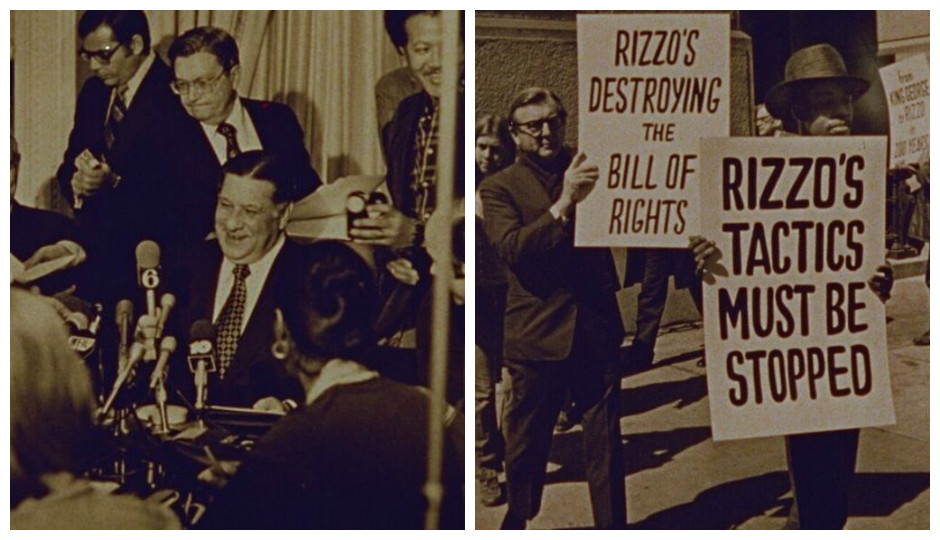Frank Rizzo Returns in Remastered 1978 Documentary

Scenes from the 1978 movie “Amateur Night at City Hall: The Story of Frank L. Rizzo.” (Courtesy of Robert Mugge.)
Frank Rizzo is having a moment.
Earlier this year, Philadelphia magazine contributor Jake Blumgart explored the sense of deja vu that people felt while watching Donald Trump‘s bombastic and routinely offensive presidential campaign grow increasingly popular across the country, and found echoes of Rizzo in Trump’s schtick — tough-guy talk and populist messaging that resonates with working class and middle class whites who want a leader who will just tell it like it is.
The New York Times made a similar Rizzo-Trump connection earlier this week. And now Rizzo’s posthumous role in this election season is going to take on another dimension with the looming re-release of a long-forgotten documentary from his heyday. Director Robert Mugge filmed the stellar Amateur Night at City Hall: The Story of Frank L. Rizzo in 1977, when Rizzo was in his second term as mayor, and the city was as divided over Rizzo’s character as voters are today over Trump’s.
Mugge was a twenty-something filmmaker who had just completed a documentary on the Pulitzer-Prize winning composer George Crumb when he began working on the project. He was living near the Italian Market, where Rizzo’s shadow was inescapable. “I just kept thinking Rizzo would be a remarkable subject for a film,” said Mugge, 65. “I was especially taken with this notion of him that I had, regarding politics as show business. He was nothing if not a showman in everything he did, from the Mummers parade to his press conferences.”
Mugge and his partners managed to cobble together funding for the film, but there was one problem: Rizzo had no interest in being interviewed. So the director and his crew got creative, shooting video of the mayor at public events, and venturing to New York City to utilize network footage of old interviews Rizzo had done with TV news outlets in Philadelphia. “None of the local news stations in Philly would cooperate with us,” Mugge explained. “But the Inquirer and Daily News cooperated. That’s why there are all these wonderful photos running through the film.”
The documentary opens with Rizzo shaking hands during a New Year’s Day parade while the Mummers do their thing. It quickly segues to local residents offering their opinions on the man himself. The pendulum swing is predictable, but entertaining. In one breath, a George Harrison look-alike in a red plaid shirt declares: “I think Frank Rizzo is a megalomaniacal, narcissistic cretin. I think he’s a petty tyrant. I think he’s an ignorant, brutal man who has clubbed his way to the top.” In the next, an older woman offers unshakable praise: “I think he’s the greatest thing that ever happened to Philadelphia.” (You can catch this moment in a 30-minute preview on Mugge’s website.)
In chronicling Rizzo’s rise to power, Mugge gives plenty of screen time to his supporters, from regulars at the Triangle Tavern to political heavyweights like then-state Sen. Henry “Buddy” Cianfrani — who was later convicted on federal racketeering charges — to extoll the virtues of Rizzo’s loyalty and no-nonsense stance on law and order. But there are more detractors on hand to document Rizzo’s heavy-handed approach to dealing with Black Panthers, protestors, and his political enemies. (An FOP boss recalls being followed — by cops! — presumably at Rizzo’s instruction.) Spencer Coxe, the then-executive director of the Greater Philadelphia Branch of the American Civil Liberties Union, is depicted describing Rizzo as having shown “all the true marks of a demagogue. He knows how to seize a situation and capitalize on it.”
There’s more, including an appearance by stripper and burlesque dancer Blaze Starr, who describes an affair she had with Rizzo — a claim he vehemently denied. The city itself is mesmerizing, a gritty and tense backdrop for the story of a man whose power scared the hell out of some residents and inspired others. “The key theme of the film became the sense of violence that was so prevalent. The white, working-class people were afraid of crime, and minorities and young people across the spectrum were afraid of the police,” Mugge said. “And there was this sense of Rizzo as this rather authoritarian figure who would use force whenever necessary to get his way politically.”
The documentary had a two-week run at the Walnut Mall Theater on the University of Pennsylvania’s campus — right when the city was clobbered by a blizzard. Mugge went on to have an acclaimed career as a director of musical documentaries, exploring luminaries like Al Green and blues legend Robert Johnson, earning praise from the Times and Rolling Stone for his work along the way.
Mugge was contacted almost two years ago by Ed Seaman, the chief operating officer of Pottstown-based MVD Entertainment, who wanted to release some of his old films on DVD. A decent print of Amateur Night was tracked down and restored; it’ll be out on DVD on June 28th. The plan is to also screen the film in Philly in July, to coincide with either the Democratic or Republican National Conventions.
The director isn’t surprised that Rizzo is still a relevant and divisive topic nearly four decades after he filmed the documentary. “We have these larger-than-life characters in America, and when their stories are told properly, they get passed down from generation to generation,” Mugge said. “Rizzo was this so-called man of action. He also had a way with words, not unlike Yogi Berra. So many things made him stand out; for one person in a good way, for another person, maybe in a bad way.”
Follow @dgambacorta on Twitter.


